An Interview with talented artist, Mr Achim Schroeteler
- Lina Petraviciute
- Oct 24, 2025
- 5 min read
It was a pleasure to meet Mr Achim in his studio. Learn about his work, journey and have opportunity to hear his voice and determination to be an artist without feeling judged - just following his own path.

At the studio in Kriens, Mr Achim Scroeteler
1. What advice would you give to an artist who is just starting out in their artistic career?
It's all about the intensity of your creative work. Ideally, you should spend 4-5 days a week experimenting and trying things out.
Don't listen too much to outside opinions; instead, listen to what drives you. Respect your own impulses, flashes of inspiration and ideas.
Don't leave your work unanswered for too long. It's important to exchange ideas, meet other artists, network and ask yourself every now and then what you really want and what interests you.
Look at other art, go to galleries and find out what you like. If possible, build up a gallery contact very slowly.
Be sure to apply for residencies and external studios. Practise the art of applying. Don't stay in the same place for years.
And very important: take breaks. Spend days or weeks away from your artistic work and see what else is out there.
2. As an experienced artist, what do you think has helped you most in developing your work?
Always working in the studio. The studio as a place of reflection, of escape, and slowly I realised that the world ticks differently in the studio, that there are no restrictions there.
Temporary work in a collective.
The appreciative reception of my work by others. This included purchases of my work, residencies and awards.
3. In your opinion, what is most important when working with galleries and building your artistic CV (portfolio)?
I have never had long-term dealings with galleries. Artist self-management has always been more important to me.
It is certainly good to have an overview of which galleries are working in your area. Do you like any of them? If so, go there often, to vernissages, finissages, and try to strike up a conversation.
It probably helps to show that you have done important exhibitions. But how do you get there? I would say with a lot of patience, but also with exhibition activities that first take place in private, semi-public spaces and then later move to more regionally known exhibition spaces.
It's important to document your work. It's exciting when friends do that for you. It gives me new perspectives on my work.
4. You have a wide range of works in different styles. Why do you think it is so important to experiment with both classical and modern styles? And why is it important to work with different materials?
Whether classical or modern is not important to me. I don't make that distinction. I follow a motif, an impulse of an idea, and consider what colour quality I want to achieve: bright watercolour, matt acrylic or bright colours that can be worked on for a long time, in which case I use oil paints. And I use both classic painting tools, i.e. applying paint with a brush, and contemporary methods, using the ends of the brush, my hands and fingernails. I find it exciting to copy fragments of pictures that I like.
I choose pictures from the Renaissance and Baroque periods. It's exciting because imitation allows me to explore unfamiliar compositions and colour palettes. It's also a calm activity. I don't have to invent anything, I can just follow. If I observe closely and patiently, the result will be good.
I think it's important to try out different materials so that you know what different colour qualities are available and what you might want to mix and combine. How it feels to work quickly with acrylics and more slowly with oils because you have to take the longer drying times into account.
5. What is the most difficult thing about being an artist and how do you deal with
negative thoughts?
It's difficult when I can't think of anything, when I don't have the energy to start.
I walk around the studio, tidy a few things, walk around, and with luck a tiny idea pops up that I can build on, add a line or a colour, and as soon as I have a pencil or brush in my hand, I can usually get started, often with a few hiccups. But sometimes it can take up to two hours before I have a pencil in my hand, or I have to tell myself that nothing is working today. Then I leave the studio. I can avoid this if I can decide the day before what I'm going to start the next day, which is usually something manual.
It's difficult to accept that I'm not one of the 5% of artists who can make a living from art. Difficult and wonderful, because it forces me to pursue a career that makes me financially independent as an artist. That's liberating, because I don't have to hope for good sales at every exhibition. It's difficult to be alone in the studio so much, so it helps a lot to have a job that brings you into contact with people outside the art world. This reduces the amount of time I spend in the studio, but it helps me to concentrate. You have two hours a day, so do something with them.
The good thing is that over the years it becomes easier not to take rejection personally. When I receive a negative response to a job application, it now only takes a few hours before I can move on. It used to be different. Back then, the crisis caused by a rejection lasted a day or two. Why am I doing this to myself, why am I letting myself be judged at all, who is judging me and how honest is such a disparaging assessment? How much time did the respective judges actually spend on me? Questions like these put the negative thoughts that gnaw at my self-esteem when I receive a rejection letter into perspective.
It's difficult to bear when what you're doing isn't good, isn't turning out the way you imagined it would, and simply looks terrible. Then the day ends badly, the night ends badly, and hours of trial and error seem to have been for nothing. Going home feeling dissatisfied is one of the voluntarily chosen difficulties of my everyday life. But then, the next day, I come into the studio and see something unexpected. There is something useful in yesterday's jumble. Wonderful.
It is very difficult when I don't sell anything at an exhibition where I am showing many pictures. The feeling of futility of my actions is then very hard to bear. Continuing and discussing the reasons for the fiasco seems professional to me.




























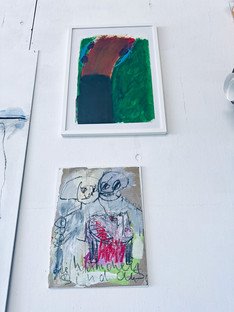




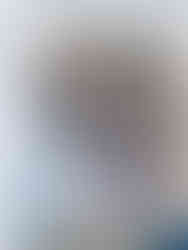








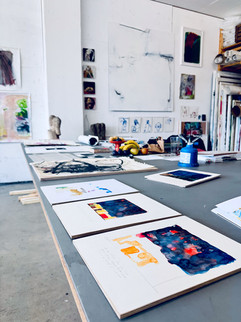





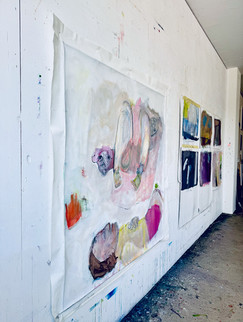




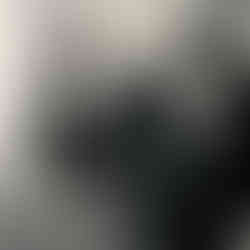


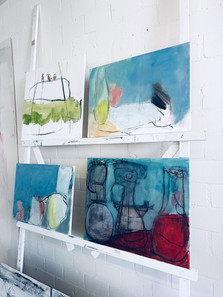


Comments